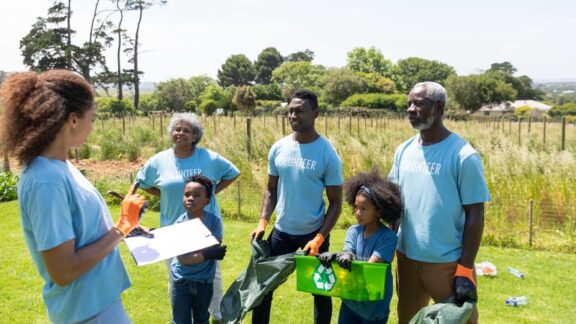Volunteer work with children can make older adults feel more alive, surrounded by the energy of youth while contributing to a brighter future for the kids and the world. Seniors Guide writer Donna Brody suggests several fulfilling ways to be “volunteer grandparents.”
Being a grandparent is the most fun and fulfilling role I have had in my life. Though being a parent will always be an essential part of my nature, the grandparent experience is different. It’s hard to put into words the specialness of this gift. Maybe grandchildren are the reward for surviving the everyday drama of raising our children.
For some adults, life without grandchildren is a reality. Some people were never inclined to become parents, some wanted to but couldn’t, and others have grandkids who live at a distance. Rather than simply being envious of those lucky enough to be called Grandma, Grandpa, Mimi, Gigi, or Pop Pop, wannabe grandparents can perform volunteer work with children.
Related: Benefits of Intergenerational Programs
Opportunities for volunteer grandparents
The following volunteer positions are grouped in categories to help volunteer grandparents match their interests and skills.
The AmeriCorps Foster Grandparents Program
UPDATE OCT. 14, 2025: The AmeriCorps website states: Due to the lapse in Congressional Appropriations for Fiscal Year 2026, AmeriCorps is closed. AmeriCorps websites will not be updated until further notice.
Recently, I came across an advertisement from AmeriCorps soliciting volunteers to become foster grandparents. It struck me that this would be an excellent way for seniors to enjoy the grandparent experience while helping children in their community.
“AmeriCorps Seniors is tailor-made for those aged 55 and older,” said Atalaya Sergi, director, AmeriCorps Seniors. “It provides a space for older adults to take charge of their ‘second act’ and use their time in valuable and impactful ways. All of our volunteers share a goal of making a difference in their communities, and many see their involvement as a chance to make friends and form meaningful connections.”
The non-profit organization Senior Connections in Richmond, Virginia, explains, “Volunteers in the Foster Grandparents Program (FGP) are role models and mentors to children who need additional support. The program provides a way for volunteers … to stay active by serving children and youth in their communities.” Volunteers work with children, mostly in school settings, from infants to age 12. They receive training, a stipend, and reimbursement for transportation. Time commitment is 5 to 40 hours per week.
Although this program may not be an option for all older adults (programs are mostly in larger cities), numerous other volunteer opportunities with children exist elsewhere.
Athletics

For seniors who are still fit and active and who enjoyed years of coaching little league or park district basketball or soccer, those opportunities still exist. Working parents with busy schedules can’t always step up to coach their child’s team. Older adults can fill this void. My husband coached both girls’ and boys’ basketball teams after he retired, and the parents loved him. They knew he never played “favorites” since he didn’t have a child or grandchild on the team.
People who like to run can volunteer in programs that encourage youth through running programs. Volunteers partner up with kids to encourage them to be active and healthy, ultimately competing in low-key community races. Volunteers can coach the young athletes in ongoing opportunities or work at events. Examples include the Go Far program in North Carolina’s Outer Banks; Girls on the Run, with dozens of councils throughout the U.S.; and Kids on the Move in Central Virginia.
Globally, Special Olympics needs volunteers to coach the athletes and work at events. Athletes include children and adults with intellectual disabilities, beginning with the Young Athletes program (ages 2 to 7).
Places of worship
If you are a member of a congregation, you know that volunteers are utilized in many roles involving children. Everywhere I drive during the summer, I see signs advertising Vacation Bible Schools. Volunteers run these programs that usually last about a week each summer. For those who want a more long-term commitment, many churches use volunteers to teach their religious education classes or in weekly programs. Churches with year-round nursery facilities may also need volunteers or even offer opportunities for paid staff.
Schools
Volunteer opportunities exist in most public school systems and private schools. Substitute teaching may be a little more than some seniors want to tackle, but other tasks can be done every day or for just a few hours a week. These include helping in the library, reading to children (or letting them read to you), monitoring the cafeteria, chaperoning a field trip, mentoring, helping with class parties, or becoming involved in before or after school care. Special events like book and science fairs are usually staffed by volunteers, too. Call the school office or check the website to find available volunteer openings.
Related: Easing Restlessness in Retirement
Hospitals
All hospitals utilize volunteers, some in positions working with children. Seek out a children’s hospital if this is an area of interest. Volunteers may be needed to help settle in a child and their family, monitor a playroom, rock babies, or read to young patients. Hospitals usually require a minimum number of volunteer hours per month, about four per week, and a commitment of at least six months.
Similar opportunities exist at Ronald McDonald Houses through the nation, serving families whose children are hospitalized or receiving intensive medical care. Volunteers touch the children and their families by cooking, greeting, listening, cleaning, or simply being there and helping out in any way they can.
Community organizations
Scouting and 4-H organizations use volunteers as well. Previous experience with these organizations is not a must. Opportunities can range from sedentary, such as science and teaching skills like music and cooking, to active, such as camping and hiking.
Big Brothers Big Sisters of America matches adult mentors with children between 6 and 18 years of age facing adversity to help the youth over the hurdles toward a successful future.
National parks and museums
Education programs are an important part of national and state parks and museums that host large groups of schoolchildren. Becoming a docent or lecturer might be a great fit for a former teacher looking to volunteer. Some paid positions are available, too. Children’s museums are eager to enlist responsible adults for art studio assistants and special events.
Opportunities that involve working with children often require background checks and proof of immunizations. After all, the goal is to help children excel and be safe while fulfilling your own desire to spend time with growing young minds.





